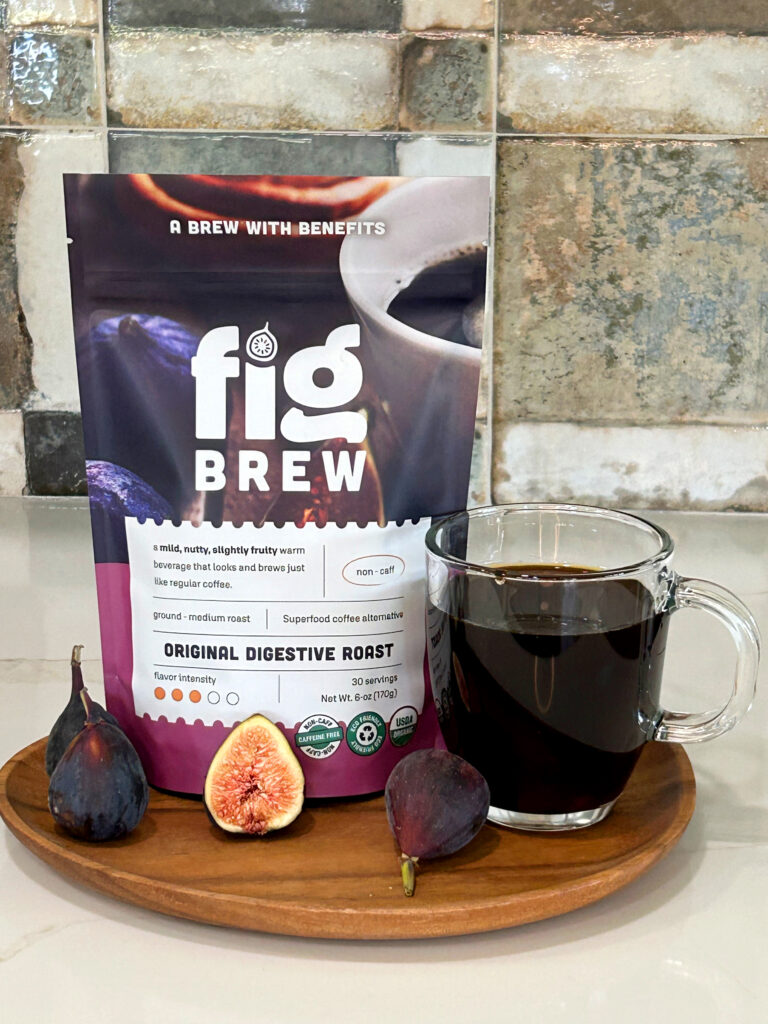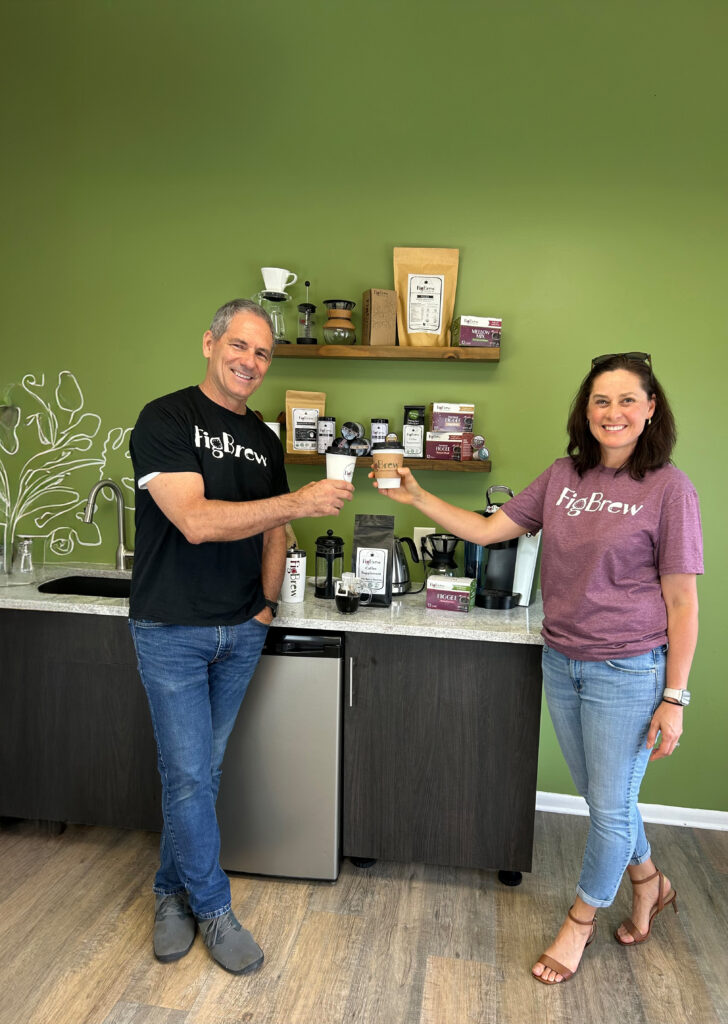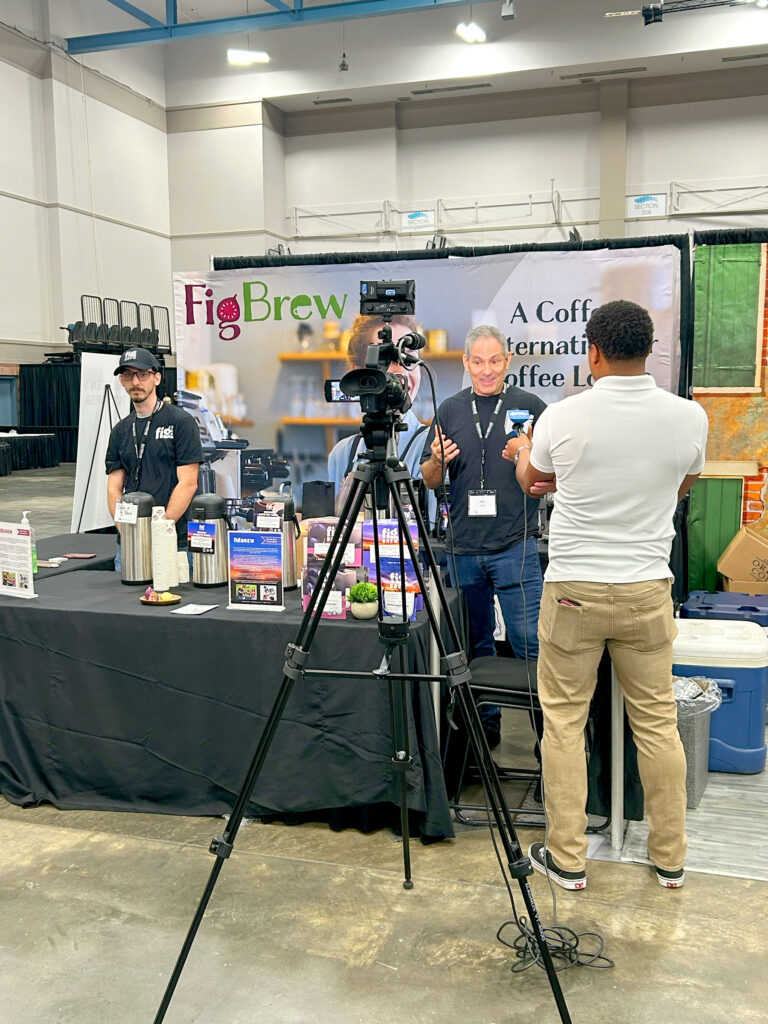Wins Awards Grows Fanbase
By Lenore Vickrey
A couple of years ago, while browsing a spring crafts show in Birmingham, Jennifer Pierce was looking for a warm drink to sip when she stopped at a booth offering samples of a beverage she’d never heard of. It was a coffee made from — of all things — roasted figs.
“I fell in love with it,” she says. “It tasted like coffee, and then I learned how healthy it was. I became a huge fan.”

The beverage was FigBrew, roasted and ground in Huntsville by founders Andy and Marianne Whitehead, members of Joe Wheeler EMC. The couple has been making their unique blend for five years and seen steady growth in their clientele every year. “We sell it as both a coffee replacement and as a coffee supplement or additive,”
Andy says.
Why figs? “I love coffee but it doesn’t love me back,” says Andy, a coffee lover since he was 12. He came up with the formula for their popular product while searching for an alternative that he would like and that Marianne, a tea drinker, would also enjoy. While doing research, he learned that during World War II in England, roasted fig was mixed with coffee to extend its life.
Fig-based beverages went back even further, he learned. “Roasted fig as a beverage has been around for hundreds of years. In 1873 there were 20 factories that made roasted fig as a beverage,” he adds. “Vienna had a worldwide reputation for their coffee houses in part because they mixed fig in it.”
After some experimenting, Andy landed on a formula that held up when mixed with regular coffee and eliminated some of coffee’s adverse effects. “It enhances the flavor of whatever you mix with it,” he says. “It’s alkaline, high in potassium, and low in sodium so it helps regulate
blood pressure.

“More than half our customers come to us because of digestive issues. There are three things people have issues with, especially older folks like me who love coffee — heart arrhythmia, high blood pressure and gastric reflux. And so when the doctor says cut back on coffee, that’s hard to do. But by replacing a portion of your coffee with ground fig, you can micromanage that coffee intake.”
Their figs are sourced from Mediterranean countries, primarily Turkey, Spain and Greece, and are grown “by people who’ve grown them for years and earn an honest wage,” says Andy. (In the U.S., figs are grown commercially only in California, he explains, “and those are the mission figs that the Spanish introduced 300 years ago. They’re good for eating but not for our purposes.”)
Then they are slow-roasted at a lower temperature than is used for coffee beans, caramelizing the fructose in the fig and creating a slightly sweet taste. “A lot of people who take sugar and milk in their coffee find they don’t have to with roasted fig because it’s still slightly sweet,” says Andy. The figs are then cooled, processed and ground in a commercial coffee grinder for packaging in biodegradable bags or single-use pods.
The pair began shipping their first batches in January 2021 and spread the word about their new product by offering samples at coffee shows around the country. People took notice. “They would say, ‘You’re the best thing at the show,’ ” says Marianne. “We were like, ‘Wow!’ It was unexpected.”
“There’s nothing else like it and it brews just like coffee,” adds Andy.
FigBrew has since won awards at several coffee shows, including “Best of Show” at the largest coffee show
in the Midwest. Most recently it took top honors at the October NOLA Coffee Show in New Orleans, winning first place in the decaf category for its Morning Prebiotic Blend, a new brew flavored with mesquite and date seeds.
The Whiteheads sell their products in select supermarkets on both U.S. coasts and in the Midwest, but the majority of FigBrew’s sales are via their website and on Amazon. Some devoted customers will drive an hour to their office in Huntsville to replenish their supply. Many, like Fay Leo of (cont. pg. 20)
Huntsville, are on an automatic shipping plan, receiving two pounds of her favorite Figgee blend every 6 to 8 weeks. She first tasted it at a Christmas show in Huntsville where they were giving out samples. It only took one taste and she was a fan.
“I use it every morning, half Figgee and half regular coffee,” she says. “I love my coffee but every morning I mix it with Figee. I tell my friends about it.” She even packs FigBrew when she travels. “When I have coffee that doesn’t have it, I miss it,” she says. “It’s a deeper, richer flavor.”
Customers like her and Jennifer Pierce are FigBrew’s prime demographic, Andy says, “because they are the ones who typically buy for the household.” But now a younger crowd is interested “and they’re asking questions about how coffee is grown, how the workers are treated, are they paid a fair wage, is it organic and so on.”

The Whiteheads are committed to producing a product that is sustainable. “Fig uses 1/8 the amount of water to make a cup of fig coffee, compared to traditional coffee,” says Andy, “and 1/13th of the carbon footprint. Coffee trees put out 1½ to 2 pounds of coffee a year, while a fig tree puts out between 40 and 60 pounds of figs per year.” Figs have 20 to 30 times the production capacity than does coffee. “If you drink a cup of coffee every day, you consume the output of 10 to 15 coffee trees. It’s a huge resource.”
These kinds of statistics are important because “the current coffee culture is unsustainable,” Andy states bluntly. Factors like climate change, disease and deforestation are combining to attack the coffee crop, driving prices up to a 50-year high. But rather than see coffee growers, some of whom are indigent farmers with a small piece of land, go out of business, “we intend to help the coffee culture be more robust and productive,” he says. FigBrew “is something that enhances what they offer, makes it healthier and more sustainable.”
As the popularity of FigBrew grows, the Whiteheads look to a future where it will be on store shelves alongside Folgers and Starbucks.
”My goal is to recreate the coffee culture in its entirety,” says Andy. “Everywhere coffee is sold, we want to be sold — in grocery stores, coffee shops, wherever and in whatever form, we think roasted fig has a place.”
Special limited time offer for Alabama Living readers:
FigBrew is offering 25% off any online order on their website with the code Alabamaliving.
Offer valid Nov. 1-30.
Read more about Figbrew at figbrew.com.
Visit their Huntsville office at 3104 Leeman Ferry Rd SW, Huntsville, AL 35801.




